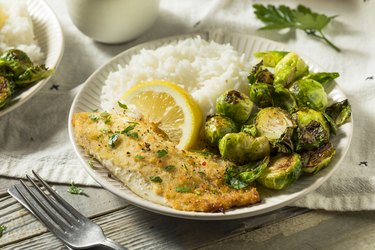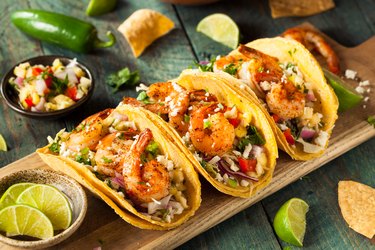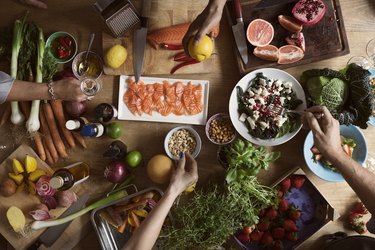
In the eating world, there are all sorts of "-arians" these days. There are vegetarians, of course, but also fruitarians (those who eat only or mostly fruit) and even breatharians (those who believe they only need air or sunlight for sustenance — please, don't try that one at home!).
Some of these eating approaches are controversial, to say the least, but the pescatarian diet is a sound, scientifically backed plan that can help you reach a variety of health goals.
Video of the Day
Video of the Day
Here, we'll dig into the definition of pescatarianism along with what pescatarians can and can't eat, the benefits and drawbacks of the diet and everything else you need to know to decide if it's right for you.
What Is the Pescatarian Diet?
The pescatarian diet is essentially a vegetarian diet that incorporates fish or seafood. The diet typically includes animal-based foods like milk and eggs but does not include meat (think: chicken, pork or beef). The term itself is a combination of the words vegetarian and "pesce," which is Italian for fish. For this reason, it is sometimes (but less commonly) spelled pescetarian.
4 Types of Vegetarian Diets
- Lacto-vegetarian: Excludes meat, fish, poultry and eggs but includes dairy.
- Ovo-vegetarian: Excludes meat, fish, poultry and dairy but includes eggs.
- Lacto-ovo vegetarian: Excludes meat, fish and poultry but includes dairy and eggs.
- Pescatarian: Excludes meat and poultry but allows fish. May or may not allow dairy or eggs.
A hurdle in following strict vegetarian diets can be getting enough protein. This isn't usually an issue with the pescatarian diet, though, because it includes fish as a major protein source.
Even though the pescatarian diet is typically regarded as a close cousin to the Mediterranean diet, it can easily be followed with all types of cuisine, including Asian, Indian or Mexican.
Pescatarian Diet Foods: What Can You Eat?
You might be surprised at the wide variety of foods you can eat on the pescatarian diet. Overall, it's an extremely flexible way to eat that includes a lot of nutrient-dense foods.
Fruits and Vegetables
All fruits and vegetables are allowed on the pescatarian diet. That's right — all of them.
When you're eating a plant-based diet, your intake of fruits and vegetables should go up (as in, these staples should fill at least half your plate at meals). The 2015-2020 Dietary Guidelines for Americans recommend you get at least 2.5 cups of vegetables each day and 2 cups of fruit (for a 2,000-calorie diet). Let that be your guide and increase the amount as needed to fill your plate.
Proteins
With a pescatarian diet, one of your major protein sources will be fish. Other protein foods that are allowed on the pescatarian diet are beans, lentils, nuts, seeds, peas, soy products like tofu and sometimes eggs and dairy.
Keep your protein sources healthy, so no deep-fried catfish or fish sticks. Use cooking methods like broiling, roasting or grilling.
Tip
Add nuts to snacks and salads to get more protein throughout the day.
Here's the protein content of some popular pescatarian sources, according to the USDA:
- 3 oz. salmon: 17 g
- 3 oz. tilapia: 21 g
- 1 cup cooked lentils: 18 g
- 1 cup chickpeas: 14 g
- 3 oz. cashews: 15 g
- 1/4 cup sunflower seeds: 7.5 g
- 1 large egg: 6 g
- 8 oz. milk: 8 g
- 1/2 cup cottage cheese: 12 g
Do Pescatarians Eat Fish Every Day?
While fish and seafood are allowed on a pescatarian diet, the 2015-2020 Dietary Guidelines for Americans recommend adults following a 2,000-calorie diet get two servings per week. With that in mind, pescatarians should aim to include other sources of plant-based protein throughout the week.
Grains
Since grains are also plants, they will be an important part of your pescatarian diet. Grains provide important nutrients such as B vitamins, calcium, magnesium, fiber and protein.
Your grain choices are vast and limited only by your imagination — and maybe cooking skills. The Harvard T. H. Chan School of Public Health calls whole grains the "complete package." Their health benefits include helping with blood sugar control, lowering cholesterol levels and cancer prevention.
Some popular, healthy whole grains include:
- Rolled oats
- Quinoa
- Brown and wild rice
- Cornmeal
- Amaranth
- Teff
- Farro
- Whole-wheat breads and pastas
- Air-popped popcorn
The recommendation from the Dietary Guidelines for Americans is to include at least six servings of grains per day and make at least half of them whole grains.
Drinks and Snacks
The "gray area" of nutrition are the foods that lie outside of normal meal patterns. This is where good healthy nutrition can take a backseat. Most types of drinks are permitted on plant-based diets, including the pescatarian diet. But to keep your intake healthy, limit or avoid sugary beverages like soda and juice and opt instead for naturally low-calorie beverages like water, coffee and tea.
As for snacks, these should fall within the types of foods that are allowed at meals. Fresh fruit, veggies, yogurt, popcorn, cheese, hummus and nuts are all good choices when planning out your snacks.
Related Reading
What Can Pescatarians Not Eat?
If you are staying firm in your convictions to eat a pescatarian diet, then you should not be eating any meat. This means no beef, lamb, poultry, pork or any other animal meat. This also means you should not eat snacks made from meat, such as jerky.
Steer clear of the candy and treats with a lot of added sugar, too. While they are technically pescatarian-friendly, you should always have your eye on the path to health. The American Heart Association (AHA) recommends that women and children keep their intake of added sugar to no more than 6 teaspoons each day and no more than 9 teaspoons per day for men.
Also, consider limiting plant-based "meats," mainly because they are highly processed and may contain large amounts of sodium. Just because you're eating a plant-based diet doesn't mean you should go overboard with salt. (The AHA recommends no more than 2,300 milligrams of salt a day.)

Pescatarian Diet Benefits
Pescatarians enjoy many of the same health benefits vegetarians do, as well as a few extra.
A plant-based diet is loaded with antioxidants, and these have a huge affect on your health. According to a November 2017 review published in Critical Reviews in Food Science and Nutrition, vegetarians have a reduced risk for heart disease and overall cancer.
Harvard Medical School indicates a plethora or health benefits for those who follow a healthy vegetarian diet, including:
- Reduced risk for developing type 2 diabetes
- Reduced risk of cancer
- Reduced risk of heart disease
- Lower blood pressure
- Lower cholesterol levels
- Lower body mass index
Adding fish to your diet will naturally increase your intake of omega-3 fatty acids, which are present in good amounts in fatty fish like salmon. According to an extensive January 2019 review published in Nutrients, omega-3 fatty acids are important in reducing inflammation, muscle soreness, cardiovascular risk factors and joint stiffness and pain.
Can You Lose Weight Eating Pescatarian?
If followed in a healthy way, yes, you can lose weight by following a pescatarian diet. According to a September 2019 review published in Translational Psychiatry, people who followed a plant-based diet generally achieved more weight loss than those who followed an omnivore diet.
There are caveats to this, as always, when looking at a certain diet for weight loss. Keep these basic principles in mind if weight loss is your goal:
- Pay attention to portion sizes
- Get enough protein every day
- Watch your intake of processed foods and added sugar

Environmental Benefits of a Pescatarian Diet
There is a lot of noise surrounding the environmental effects of varying diet patterns. According to an April 2019 study published in Nutrients, researchers indicated that a pescatarian diet reduced greenhouse gas emissions by 64 percent relative to diets that include meat, which is slightly more than vegetarian diets at 63 percent. But the vegan diet wins in this regard by reducing greenhouse gas emissions by 83 percent.
The environmental footprint of the pescatarian diet on other environmental factors — such as cropland, freshwater, nitrogen and phosphorus use — are comparable to vegetarian diets and less than meat-oriented and protein-oriented eating plans. So, if you are looking to reduce your footprint on the environment with your diet, plant-based eating is a great way to start.
Related Reading
Drawbacks of a Pescatarian Diet
When switching to a pescatarian diet, you are likely to experience some frustrations.
Meal planning: One of the biggest changes when adopting a plant-based diet is the need for meal prep and cooking. While there are shortcuts in the grocery store (pre-cut veggies, canned beans, pre-cooked grains), it is essential that you have a plan in place every day for meals. Otherwise, you might get stuck at the snack machine staring down all the not-so-healthy (albeit pescatarian-friendly) options.
Mercury in fish: Another concern when adding large amounts of seafood to the diet is the risk of ingesting too much mercury. For this reason, the National Institute of Environmental Health Sciences indicates those who should watch their seafood intake include young children, pregnant women and nursing mothers. However, up to 12 ounces a week of fish low in mercury levels is fine for most people.
What Fish Is High in Mercury?
Fish with high levels of mercury are shark, swordfish, king mackerel and tilefish — these should be limited or avoided. Get the full breakdown here on fish with the highest and lowest mercury levels.
Bottom Line: Is a Pescatarian Diet Healthy?
If you're looking to make the change to a healthier diet and not sure where to start, the pescatarian diet may be for you. Following a plant-based diet is a healthy and sustainable diet pattern that has proven to provide health benefits and reduce the risk of many common chronic conditions.
If dieting and meal planning leaves you frustrated and confused, ask for help. Reach out to your health care team and ask for a referral to see a registered dietitian nutritionist who can guide you in the right direction with your current health conditions, activity level and goals.
- USDA: "Salmon"
- USDA: "Tilapia"
- USDA: "Cashews"
- USDA: "Sunflower Seeds"
- USDA: "Milk"
- Harvard T.H. Chan School of Public Health: "Whole Grains"
- US Dietary Guidelines 2015-2020
- American Heart Association: "Added Sugar"
- Critical Reviews in Food Science and Nutrition: "Vegetarian, vegan diets and multiple health outcomes: A systematic review with meta-analysis of observational studies"
- Nutrients: "Omega-3 Polyunsaturated Fatty Acids: Benefits and Endpoints in Sport"
- Translational Psychiatry: "The Effects of Plant-Based Diets on the Body and the Brain: a Systematic Review"
- National Institute of Environmental Health Sciences: "Mercury"
- Nutrients: "Dietary Change Scenarios and Implications for Environmental, Nutrition, Human Health and Economic Dimensions of Food Sustainability"
- USDA: "Lentils"
- USDA: "Eggs"
- USDA: "Chickpeas"
- USDA: "Cottage Cheese"
- Harvard Medical School: "Becoming a Vegetarian"